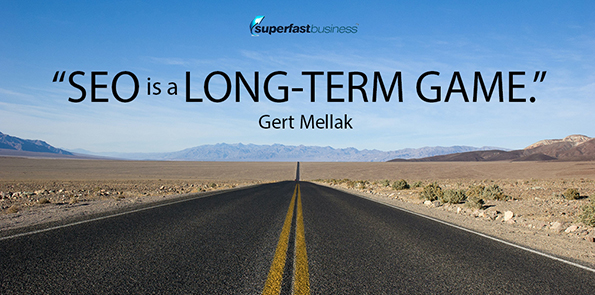A significant number of online companies spend on hired SEO help. If you’re part of that number, how do you know you’re getting your money’s worth?
SEOLeverage’s Gert Mellak is back to share how his agency handles clients, what to look for in your SEO service provider, and when to turn elsewhere for SEO assistance.
Podcast: Download (Duration: 27:37 — 25.4MB)
Get Notified Of Future Episodes Apple Podcasts | Spotify | Amazon Music | Android | Blubrry | Gaana | TuneIn | Deezer | Anghami | RSS | More
Podcast highlights:
01:41 – The typical agency approach
03:17 – Let’s do this differently
05:06 – How transparent are the dealings?
07:14 – The content of those Zoom calls
09:23 – Who does Gert work with?
10:22 – Be prepared to pay this much
11:54 – The amount of involvement with content
14:21 – What about the email aspect?
15:13 – Is the Slack interaction typical?
16:07 – Knowing what you can and can’t do
19:02 – The signs that something’s amiss
21:06 – When the client hasn’t got a team
21:48 – Teaching for team members
24:17 – How important is SEO these days?
Take your business to new heights of effectiveness with help from James
Transcription:
James: James Schramko here. Welcome back to SuperFastBusiness.com. This is Episode 741. And I’m chatting with my good friend, Gert Mellak, from SEOLeverage.com, over there in Spain. How are you, mate?
Gert: Hi, James. I’m doing great. Thank you very much for having me.
James: I love our chats. We talk about SEO, you have an SEO business, I used to have an SEO business. We have a lot of things that we could talk about in common. You were kind enough to help us with our SuperFastBusiness website SEO. And we got great results. And we did a podcast about that earlier. And we’ll link to that in the show notes.
What we want to talk about today is, what if we’re not SuperFastBusiness, you know? What if we’ve been listening to the podcasts, and we’ve been paying money to someone to do our SEO, but we’re not exactly sure what the SEO is doing, and we don’t know how to tell if the results are good or bad, or if they could be better?
The typical agency approach
So I think it’d be interesting to talk about how you approach it as an agency, when you first meet a client, and let’s talk about your process. Because I thought that was really the power in what we did together. It wasn’t just, oh, let’s get some help with SEO. It was, okay, that’s the starting conversation. But then there are steps that have to happen. And over the years, you’ve refined the steps that happen to get a good result for your customers. So let’s compare those steps to what’s out there in the marketplace. And let’s see if you can take us through those steps, which I think you call ERICA.
Gert: Exactly. Thanks, James. This is such a great point to bring up, because I would suggest 90 percent of our clients who contact us on the first time, and when I ask them about what they did in SEO before that, they pretty much tell me they don’t really know what their agency is doing, what is being done on SEO, and if it really yields great results. And this comes back to a traditional approach of SEO agencies of doing an initial briefing with clients, setting everything up and then sending a monthly reporting and keeping touch points with clients to a minimum to increase their margins, okay?
What these leads to is that clients, over time, they keep paying, and as long as rankings and traffic doesn’t go down, they usually keep paying, but they don’t really know what they’re paying for. It’s just too complex for them, it’s too complicated or they think it’s too complicated. And for the agency over time, this leads to unhappy clients that might be continuing to pay for a while, but as soon as one or two important rankings go down and they lose their phone calls, they lose the inquiries, they’re going to cancel.
Let’s do this differently
So this is where we, years ago, already thought, we need to do this differently, and came up with this framework we call ERICA. And ERICA, we can afterwards go into the details of it, essentially focuses on two touch points every month with clients, which is essentially a strategy call on Zoom, where we exactly make sure with hundred percent transparency that they know what’s going on on their website, what’s working, what’s not working, what competitors are doing, what’s working for them, and how we can leverage it. And a lot of other things. So we have, right from the start, we have a full transparency approach. We make sure that clients first of all know where they are from a neutral perspective, not from the last monthly reporting on an Excel spreadsheet they might get from their agency. And then on from there, explain why we suggest certain next steps in order to move forward, in order to leverage the existing website for organic traffic, how to increase click through rate, how to increase organic traffic to the existing articles, and how to structure the entire website, etc.
 James: One thing I’ve noticed about some SEO businesses is they won’t share their process. And even with our own SEO business, I will say some of the intellectual property we had was proprietary and could not be shared with the clients. Although, we were not doing anything underhanded, we were doing something super high value, that was our special sauce. And that was the ability for us to get really good quality organic content placed out there, and linking back to the client site with correct anchor text. So I guess there’s got to be a limit to disclosure, and it depends on how much you’re advising versus how much you’re doing.
James: One thing I’ve noticed about some SEO businesses is they won’t share their process. And even with our own SEO business, I will say some of the intellectual property we had was proprietary and could not be shared with the clients. Although, we were not doing anything underhanded, we were doing something super high value, that was our special sauce. And that was the ability for us to get really good quality organic content placed out there, and linking back to the client site with correct anchor text. So I guess there’s got to be a limit to disclosure, and it depends on how much you’re advising versus how much you’re doing.
How transparent are the dealings?
Is there a scenario where you’d be doing things for the client that you wouldn’t necessarily want to just give them the blueprint? Or, given now that you’re training people on how to do SEO, are you just open about what you’ve been doing?
Gert: We are pretty much, I would say, 98 percent, 99 percent open about what we are doing. There is always, when we are also involved in implementation – sometimes it’s all only consulting – when we are also involved in the implementation, there are a few things probably that just come back to our experience of, in which order, in which priority, which time span. We create links, for example, from different sources, how we mix them, etc. are not really interesting for clients to know about. This would be our personal IP or our intellectual property of SEOLeverage. The rest is really full transparency.
“In SEO, there is little you can hide.”
In SEO, to be honest, there is also little you can hide. Okay? As soon as an SEO agency or another SEO consultant takes out the site and sees what’s working, what backlinks are generated, links from other websites pointing to certain pages, etc, what’s the content on a page, there is little you can really hide. So I don’t really see the necessity of having too many secrets around the process. We are very transparent. We are very upfront with clients and say, Look, this is a ranking that went down. Why do we think it went down? What can we do about it? What’s working for clients? How can we leverage it? And how can we bring it back up?
James: One thing I’ve enjoyed is the consulting aspect of it, where we’ve had some decisions to make. It’s been good to have that conversation, like I would do with some of my other professional advisors, the legal advisors or accounting advisors. I love that I’ve been able to have a chat with you about scenarios and say, Hey, here’s a change we want to make, or we’ve noticed this thing going well. What would be our next step? What’s your best strategy around maximizing this opportunity? And I love that we can have an interaction, and then we get feedback and a discussion around it, and then we implement. And then sooner or later, around comes the next report. And I love that you’re sending reports and taking us through that. Would you like to share what sort of things you talk about on those Zoom calls you’re doing with your clients?
The content of those Zoom calls
Gert: Absolutely, absolutely. We have this framework called ERICA. So it definitely goes back to learnings from SuperFastBusiness to come up with acronyms, come up with processes to assure that certain tasks always have the same quality, maintain the same quality level. So thanks for this. ERICA is an acronym for evolution, research, interlinking, content and action steps. And what this framework does for us is that it makes sure that everybody on the team that’s responsible at the end of the day for SEO, which is not only the SEO agency, but also content writers, the client’s in-house team, CMOs, VAs, whoever’s working on the site, tackles the most important parts of SEO on a bi-weekly basis.
So every couple of weeks, we do the Zoom call. And first of all, we go through the evolution over time. So clients and the team get an idea about where the site is now in terms of rankings, in terms of traffic, in terms of organic conversions that come from Google, and also about the history we went through. So we had a client, for example, who came to us after losing more than 70 percent of their traffic in a Google update. And we can now always refer back to the history – this is where you were before this update; this is when you came to us; this is how we went back up. Right now, they’ve kind of doubled the traffic I think they had before that.
So this is the evolution we make sure clients know about, but also the evolution about their competitors. So you’ve got two kinds of competitors here. You’ve got competitors you have on your radar, because you’re checking their website, you have been following them for years. And then every single blog post on the web can technically compete with you on Google for your target clients’ attention. So the evolution is really making sure everybody knows what’s happening right now. Where do we rank? Where do our competitors rank? What’s working? If they see any competitor getting a lot of traffic, or even sometimes we can leverage traffic drops of competitors. If there’s a competitor losing suddenly traffic on a certain keyword, we can step in, do some research and find out why they dropped and make sure we leverage their drop for our clients’ growth.
Who does Gert work with?
James: Right. And when you say our clients, what kind of clients have you typically been working with? Well, I know it works for us, for example. So, we had quite a lot of content and when we started trimming and pruning and sculpting our website better, it made a huge difference. But I’m sure you have different types of clients.
Absolutely. We have all different sizes, from our local businesses, where we do like what’s called local SEO, which is a little bit different from from other types of SEO, to big corporations, stock market listed companies and international corporations. So we have different sizes, we have ecommerce business, some Shopify stores, there’s a little bit of everything. Some blogs. We chose to have business onboarded that’s usually traditionally focusing on Facebook ads and they are now going to add an additional organic pillar to have a more stable foundation on their business. So it’s all kinds of different businesses, and to be honest, from a one-man business or one-woman business to large corporations, we’ve got everything.
Be prepared to pay this much
James: Right. So what would someone be looking to pay for this as a ballpark? Because you obviously have a lot of SEO providers out there, in varying degrees of level as the marketplace, SEO providers who are sort of doing stuff at the sort of freelancer rate. You’re dealing with a lot of solo operators. They may or may not be doing a good job. I’d lean towards one way in my opinion on that. Then there’s the super agencies, like the very expensive agencies who are dealing with large corporations. And then there’s that sort of middle pack of regular service providers. They’re not big, flashy agencies. They’re not one-man bands, which I probably put you into that category of just a regular agency with a decent size team and a great track record. What are we paying for something like this process?
Gert: You probably need to be prepared to pay a few hundred dollars a month as the starting point for ongoing consulting. We do have a low entry package if you are a little bit savvy on SEO or just want additional guidance. We have like a private coaching, very similar to SuperFastBusiness, where I step in on a private chat, I give a little bit of guidance on where the priorities should be, or can give a little bit of advice on on a keyword research that has been done, etc. This would be a low entry point, below a hundred dollars. Then for consulting, you need to be prepared to probably look into $500 to $800US, approximately. And then it depends on the services you hire an agency for, when it comes to the implementation. Or if you do it in-house, that’s up to you, how you leverage and set up your team. And we work with teams very, very often, also involved in team training.
The amount of involvement with content
James: Would you say, over the years, companies have gotten more involved with content marketing? Like, businesses like mine, for example. We have a team and we can create content. What are other businesses out there, especially ecommerce stores, doing?
Gert: Absolutely. They usually have a content person. So most of our clients have someone writing the content who is very savvy in their niche, and writes the content based on our instructions. So part of the consulting is that we create, for example, content briefs. So we ask them to produce a certain piece of content, or we want to optimize an article for better rankings, we do an analysis which has a manual part and also a machine learning assisted part where we extract from Google, what do the top ranking articles have in common, and how can we leverage this information to optimize our content piece to make it directly eligible to rank on page one, for example. Because very often our clients might produce content pieces they think are interesting for the target audience, with having probably social media in mind, and they want to share it on Facebook. But those content pieces are probably not necessarily eligible to rank on page one, because Google might miss a few topics, might miss a different angle they want to see, etc.
So we do this kind of research, for example, but most of our clients definitely have at least one person who is usually responsible for writing the content. Sometimes it’s the same person maintaining the website. In larger companies, usually they have like a marketing team. There’s a webmaster, there is a content writer, there might be a CMO overlooking the entire strategy. So this is usually the setup we encounter.
James: And who comes to the calls with you?
Gert: We usually have the calls with the site owner, or if it’s a larger corporation it’s usually a person from the marketing team. It depends really on the size of the business. On smaller sites, there is definitely a site owner plus, usually, one or two people more on the call to hear everything. We sometimes record the calls so they can then share them with their team, so everybody knows what we were talking about. On larger corporations, you usually have either a head SEO, if it’s an international cooperation who was on the call, or at least an original SEO. Or you might have the responsible CMO on the call who wants to know how this channel is performing, and what is going to be done to increase the performance.
What about the email aspect?
James: And what about email support? I think that’s part of your program. Who gets those emails?
Gert: Yeah, absolutely. Email support is part of it. Because between the calls, there might be additional questions we need to sort out, so we have every couple of weeks a scheduled Zoom call for between 30 to 60 minutes usually. And then we have a help desk, where me and my team are getting in every day to answer additional inquiries. So there might be a client needing urgently another content brief, we just deliver before the next call, or there might be a question about the last session we did. So we have a shared document with clients where we walk them through the steps, put in screenshots of performance, graphics, etc. So we know what’s the current situation, what’s the plan, why do we need to perform certain actions. And then the emails end up in our help desk, where we step in every day a few times to answer as quick as possible.
Is the Slack interaction typical?
James: In our case, we’ve been dealing with you in our Slack as a contractor. And that’s been amazing for us. Is that something other people could take advantage of, or was that something special for me?
“Slack is so common and has been growing so fast lately that it absolutely makes sense to engage via Slack with clients.”
Gert: I think you were the first one who got this special service. No, but we also have other clients who already invited us to their Slack channel. It definitely makes sense if you have a communication tool like Slack. We have been using this as per your suggestion for years now. If you have a communication tool that just works for you, we are not going to be an external partner, be the one that forces you into another way of communication. We are very happy to jump on your Slack channel and engage with your team directly. So that’s definitely not a problem. Obviously, we can’t tackle 20 different tools, but Slack is so common and has been growing so fast lately that it’s absolutely, it absolutely makes sense for us to also engage via Slack with our clients.
James: I think when they opened up that feature I was the most excited person on the planet. It is our virtual workplace, and to have a visitor virtually is phenomenal. It really powered up our business last year.
Knowing what you can and can’t do
What about when you have, you know, when you take on a client – I’m going to ask you a sensitive question – are there times where you can’t improve the result?
 Gert: I think it’s a fair question. And I have to say, we have been getting pretty good at assessing what we can and we can’t do over time. So I’ve been doing this for 19 years, I’ve been through all the algorithm updates. I’ve started this before there were official algorithm updates. And we have received them or gotten to a level where we get quite good at assessing also what it can take to improve results. Okay? So SEO is a long term game, there are quick wins you can do, which are going to produce results 99 percent of the time, within weeks. And then there are things that might take six months, eight months, 12 months depending on how competitive your niche is.
Gert: I think it’s a fair question. And I have to say, we have been getting pretty good at assessing what we can and we can’t do over time. So I’ve been doing this for 19 years, I’ve been through all the algorithm updates. I’ve started this before there were official algorithm updates. And we have received them or gotten to a level where we get quite good at assessing also what it can take to improve results. Okay? So SEO is a long term game, there are quick wins you can do, which are going to produce results 99 percent of the time, within weeks. And then there are things that might take six months, eight months, 12 months depending on how competitive your niche is.
So there are rare cases where I’m not confident enough to be able to work with the project, but this is not only an SEO-related issue, but it’s also an issue about certain niches, maybe, that work a little bit differently. Certain team set ups or types of sites where we are not, we take the initially, the flexibility we have to add content, to optimize the website, to do technical updates on the site, etc. And clients might say, now, the site is not going to be touched. We’re just leaving it like this. We don’t want to risk any possible errors, etc. It makes it very hard for an agency then to be able to help a client. So there are rare cases where we would just, in the initial evaluation call, tell the client, Look, I don’t think we’re a good fit due to these three reasons, for example, and maybe in case there is some way to overcome this, we are happy to help. Or otherwise, we would refer to maybe a known other agency or to web support provider or whatever.
James: Nice. Do you ask them for a referral as well? And maybe they know someone who you can help?
Gert: I obviously, I would refer to some trusted partners, obviously. But of course, sometimes it happens that even people we reject refer other companies to us for SEO services where they think we might be able to help. This does happen.
James: You probably earn some trust through that process. Is there a charge for that initial assessment phone call?
Gert: No, they are free, because obviously, the client can’t know what comes out of this call. And for us, it’s a good way to get to know this client, see what they have been doing in the past, analyze their possibilities, their competitors. And very often we can discover what we call like a gap or a content gap between what they have in terms of rankings, what they could have in terms of rankings based on the current situation, and can like, discover their potential from a more specific point of view. Because there’s a difference if someone has a website and says, Yeah, this competitor is bigger than then on my site and I want to get there. Or if you can specifically point out different topics they need to cover on their website from a content perspective, where they’re definitely going to be getting a part of the pie.
The signs that something’s amiss
James: What would be the typical signs you hear from clients that have been trouble for them with their previous supplier? So that someone listening to this might recognize some of these signs if they have a supplier that’s not doing the best job for them?
Gert: Absolutely. A typical sign is complete lack of responsiveness, lack of transparency, or a huge time delay in delivering reports when they are asked for them. Minimizing touchpoints wherever possible. Some clients only deal with sales representatives, but not with SEOs themselves, which is a very big part as well, because the sales rep is not going to be able to answer your detailed specific questions about your site. It’s different if you deal with someone who is actually doing the work and analysis themselves.
 Also, whenever there is an agent saying something like, you need to stick with us or you’re going to lose rankings, or you need to accept that we are not sharing our secret formula on how we get you ranked. They are definitely also not going to share anything when you drop in rankings. So I would definitely look for a hundred percent transparency and also willingness to help you with your ongoing business goals, and leverage some parts of your niche or some opportunities in your niche that might present themselves that are not exactly only SEO-related.
Also, whenever there is an agent saying something like, you need to stick with us or you’re going to lose rankings, or you need to accept that we are not sharing our secret formula on how we get you ranked. They are definitely also not going to share anything when you drop in rankings. So I would definitely look for a hundred percent transparency and also willingness to help you with your ongoing business goals, and leverage some parts of your niche or some opportunities in your niche that might present themselves that are not exactly only SEO-related.
So we had, for example, a client pointed out to us that one of their competitors went broke and we were able to purchase that competitor’s domain, create an entirely new website. And this has been a six-figure business since then, just as a side project from the SEO. And this really came out from the conversations we maintain with clients where they tell us a little bit about their niche. One of my first questions on the call is usually, what’s going on in your niche? We now have the coronavirus going on, how is it affecting you? What about your competitors? etc. So from these conversations, there is a lot of value you can get out of it. And imagine, if one comment produces a six-figure business just as a side hustle of what you actually want to do, you can see that’s definitely worth it.
When the client hasn’t got a team
James: Right. And when a client doesn’t have a team, do you have people who can do the implementation? Like, you know, adding things to the website, creating the content, etc?
Gert: Absolutely. It’s a service we offer to clients if they want, also, even to clients who have a team but maybe the team is either not savvy in SEO or they’re just busy doing other things and they want to move faster. We do have a growing team. Right now we have 10 people on the team and are growing quickly in the next month and have been growing quite a bit in the last month. So we do a lot of implementations as well. We have content writers, we have people who are able to optimize websites, even from a technical perspective. So we have like a very broad setup to take in SEO tasks on the implementation side as well.
Teaching for team members
James: Very nice. And if people do have team members, and they want to brush up on SEO, you do actually have an SEO fundamentals course that’s just come out. Is that right?
Gert: Exactly. We have just launched a course, and this really came out from these conversations as well, because it came up all the time that our clients are saying, look, I have a content writer, but they don’t really know about SEO. They just write good articles. Can you train them? Do you have something? What materials should we give them? So, essentially, what I did was, I had like a few Google Docs and spreadsheets and video links, etc, for my own team. So when someone joins my team, I put them through these documents, we have an SOP for the training, and put them through different models. And what I essentially did is, I recorded quite a few videos on the different sections myself and put it together as a course we can now deliver to our clients or to anyone who wants to train their team or get themselves up to a certain level in SEO, so they can at least understand what the agency’s telling them.
“Very often, agencies are not very good at explaining what they do in SEO.”
So very often, agencies are not very good at explaining what they do in SEO. But sometimes it’s also just because you need to know at least in basic terms, if you don’t know what a keyword research is, or why you do it, it’s very hard to assess if the agency did a good one or not, or if you don’t know how Google essentially works with three fundamental things, it’s very hard to assess if you need an SEO agency or not. So this course really covers the fundamentals. It’s not an advanced, high, specific course. But it definitely is a course that gets your existing team up to speed or gives you basic information about what SEO is, what its capability is, and the main elements of how it really works on an ongoing basis.
James: And where do you get the course, Gert?
Gert: The course is at SEOLeverage.com. We’ve got a course and coaching section, so you can get the course there. And it even comes with a couple of months of private coaching from me where I answer questions and help people to apply the course a little bit to their website as well, because this is something we have found with many courses, that they are just too theoretical, there is no practical advice, it’s very hard for them to take the videos or other material and then apply to the website. So we decided to offer a couple of months of free additional coaching so they can say, look, I now know how to do keyword researches. Take a look at this research if this works for our site. Or, what would be the next step? Should we focus on links? Should we focus on content? Should we focus on taking the SEO or usability? So they have someone with experience in the field to bounce back some ideas.
How important is SEO these days?
James: Perfect. Well, that’s been very helpful. And I’m interested in your thoughts just in the overall picture. You know, I’ve been interested in SEO since about the end of 2005 when I started, and I’ve been writing SEO that whole time, 15 years. Is SEO still important and worth doing in 2020?
 Gert: Absolutely, it is. Because the amount of information out there is growing all the time. A huge percentage of searches Google receives haven’t been seen before. So people find out more ways of how to search for certain things. And search marketing in my opinion has a very important role, because when someone does a search, they’re really in this moment of having a strong desire to consume a certain piece of information, right? I very often compare this with, or contrast it with Facebook or Instagram where you are in your state of mind of relaxation, or you’re waiting for a bus or whatever. Some content comes up, and you might not have the moment or the state of mind to really consume this content. Whereas in search marketing, you have people who decide to search and research a topic, search for possible providers, they probably have set aside the time for it, and they are really ready to consume and very often ready to take action.
Gert: Absolutely, it is. Because the amount of information out there is growing all the time. A huge percentage of searches Google receives haven’t been seen before. So people find out more ways of how to search for certain things. And search marketing in my opinion has a very important role, because when someone does a search, they’re really in this moment of having a strong desire to consume a certain piece of information, right? I very often compare this with, or contrast it with Facebook or Instagram where you are in your state of mind of relaxation, or you’re waiting for a bus or whatever. Some content comes up, and you might not have the moment or the state of mind to really consume this content. Whereas in search marketing, you have people who decide to search and research a topic, search for possible providers, they probably have set aside the time for it, and they are really ready to consume and very often ready to take action.
“Search marketing has a very important place, and it’s not going to go away.”
So search marketing definitely has a very important place. I think it’s an important pillar of the overall marketing mix, and it’s not going to go away. We’ve got virtual assistants providing results based on search results, for example. So everything that gives an answer at the end of the day is going to rely on SEO, on search optimization, be it the App Store, be it Alexa, be it Google assistant, etc.
James: Great. Well, I’m still into it. I reckon it’s terrific. When we look at our sales, we can see organic gets a very qualified lead. It was shocking to me how much of the masses of content we published were not getting eyeballs afterwards. So there’s a real art to getting the content you’ve got optimized to take advantage of the search intent, to have it funneling through your site the right way, to make it easier for Google to understand what your site is about. All of these things you’ve reminded us of, and you’ve gained us a terrific result. That’s why I was pleased to have you on the show.
Gert Mellak, SEOLeverage.com. Thank you so much again for generously sharing with our audience here at SuperFastBusiness, and also for, you know, the personal contribution you’ve had to getting this show out into the marketplace. There’s a very good chance that someone listening to this episode actually came from content that was not being seen prior to when you were giving us help, you know, for our case studies. So that is the power of SEO. And we did do a case study, Episode Number 723, if you want to go and check that out and see what Gert did for us and how it worked. Thank you so much, Gert. Take care.
Gert: Thank you, James. Always a pleasure to have a chat.
James: If you liked this show, be sure to share it with someone who’s maybe not getting looked after properly with their SEO or they want to train up their team. Get it out there. Spread the Love. We don’t run full-on sponsorships on this show. So I really appreciate you listening to this episode. I’ll catch you on the next one.
James shares his expertise with your business inside JamesSchramko membership
Need expert SEO help? Get hold of Gert at SEOLeverage.com
Liked the show? Leave us a review on iTunes










Leave a Reply